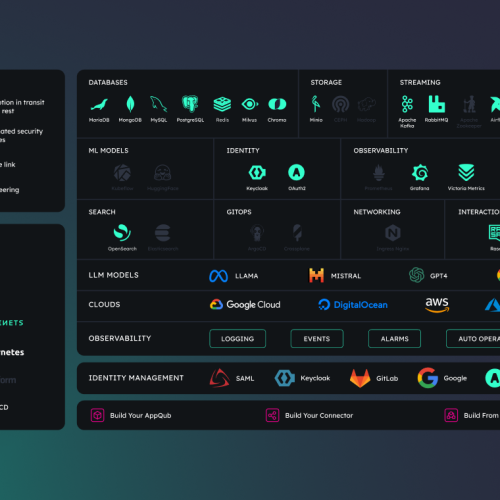This is a guest post by Ihor Sheiko, managing partner of Digicode, company providing high-quality solutions in software development, cloud, AI, big data, and automation. He emphasizes that a smart data strategy and adaptive data management system are essential for every company, regardless of target audience and industry. It’s no secret that data-intensive organizations have a competitive advantage.
Foundational importance of data management
The data management process covers a wide range of tasks and procedures in modern business operations:
- Collection, processing, verification, and storage of data.
- Integration of different types of data from disparate sources, including structured and unstructured information.
- Introduction of high data availability and disaster recovery.
- Regulation of data use and access by users and applications.
- Protection of data and support data privacy.
Effective data management processes represent a background for informed decision-making, operational productivity, and business growth through the usage of the following practices:
- Data Governance Rules. They create a precise framework for data governance that outlines policies, roles, responsibilities, role-based access controls (RBAC), and other data management procedures.
- Data Lifecycle Management. It implements guidelines for the generation, storing, processing, archiving, and disposal of data and garbage collection.
- Frequent Backups. These actions are needed to avoid data loss and enable speedy recovery during accidental deletion or system failure by establishing automated and routine data backup procedures.
- Data Recovery Plan. It guarantees that business operations are disrupted as little as possible during data loss or corruption.
- Continuous Monitoring and Improvement. The procedures establish continuous monitoring systems to reveal possible problems before they become destructive.
Unstructured digital assets that include text, video, audio, web server logs, social media, and more actually make up more than 80% of data. For businesses that can figure out how to use it, this fact represents a significant untapped resource providing a competitive advantage.

Improving data quality and accuracy
Efficiency and sustainability are key to implementing a comprehensive data quality management strategy. This approach includes identifying data quality issues and their impact on decision-making and operational efficiency.
Advanced data management is a foundation for ensuring high data quality through the usage of the following methods:
- Master Data Management (MDM). MDM techniques guarantee that important data is available throughout the company in a unique version.
- Automated Quality Checks. They must find and fix problems quickly and incorporate automated data quality checks into extract, transform, and load (ETL) operations.
- User Training. This strategy is needed to educate specialists working with end-users of data.
- Feedback Mechanism. It creates a system for gathering opinions from users, data analysts, and other stakeholders.
In a progressive technology-driven world, new tools and technologies are always emerging to change how specialists collect, store, and consume data. Over the forecast period from 2024 to 2032, the global big data and analytics market is expected to achieve a 14.9% compound annual growth rate by reaching USD 1,088 billion by 2032.
Compliance and risk mitigation
Any application, analytics solution, or algorithm used in a business depends on seamless data access. A data management system is designed to ensure data security, availability, and accuracy.
In addition, industry-specific privacy and security standards, as well as national and international data privacy laws like the US California Consumer Privacy Act and the EU General Data Protection Regulation (GDPR) must be complied with through effective data governance.
Data management is a critical factor in ensuring data integrity. By implementing data management best practices, companies can enhance their risk management capabilities, improve reporting accuracy, and achieve regulatory requirements. The primary actions to complete these tasks include the following steps:
- Sensitive data discovery and classification.
- De-identification, masking, tokenization, and bucketing.
- Testing, monitoring, and continuous improvements (if needed).
Reliable data is critical to identifying and assessing risks. This approach enables business owners to properly identify potential threats, analyze their impact, and formulate effective mitigation strategies.

Empowering business intelligence and analytics
Modern businesses rely on accurate information and data-driven strategic planning and growth decision-making. The growing importance of data warehousing, business intelligence, and data analytics illustrates how enterprises leverage robust data management tools and analytics platforms to support decision-making. The average company uses more than 3.8 business intelligence solutions. By 2026, the market for analytics and BI applications will grow to $18.5 billion.
BI involves the processes and technologies that help extract meaningful information and actionable insights from data. Through reports, dashboards, graphs, summaries, and charts, business intelligence tools display analytics and insights derived from an organization’s data. In addition, such tools empower a wide range of decision-makers within the company.
For example, marketers track campaign performance or customer behavior on real-time dashboards. Finance departments collate data from all departments to see what factors influence profit and loss. Sales teams use business intelligence dashboards to monitor crucial performance indicators, while operations teams use BI to optimize business operations.
Data scalability and adaptability in a dynamic environment
AI-powered data management solutions offer organizations the flexibility and adaptability they need to handle ever-increasing volumes of data. These systems can dynamically adapt to changing data management requirements. This approach allows specialists to increase capacity and tune performance smoothly without manual intervention. By supporting a variety of media and architectures, AI-enabled data management systems can scale efficiently to meet the demands of various workloads and use cases.
By intelligently managing data across on-premise, public, and private cloud storage, AI-enabled systems offer a unified storage platform Google BigQuery that simplifies data management and improves application performance. This integration allows companies to benefit from the benefits of different storage environments. At the same time, this approach provides the necessary scalability and flexibility to accommodate data growth.













